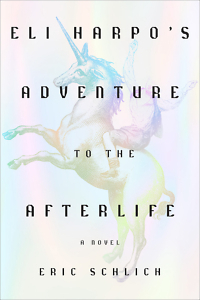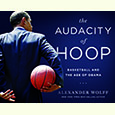The Heaven Con
In Eric Schlich’s new novel, a preacher’s son comes clean about his near-death experience
Growing up is hard enough without the added pressure of being God’s prophet. The young hero of Eric Schlich’s new novel, Eli Harpo’s Adventure to the Afterlife, wishes he had the same preoccupations as every other 13-year-old — school, friends, girls. Instead, ever since he survived heart surgery at the age of 4 and reported going to heaven, Eli’s father has pushed him into the public eye, using Eli’s vision of eternal happiness to bring comfort to the elderly and the dying.
 To help spread the good news about his son’s experiences, Simon Harpo self-published a book, Heaven or Bust!, which he totes in the family van and sells in nursing homes and hospitals. Eli, trotted out by his father to display his chest scar, wants to stop performing in this religious sideshow.
To help spread the good news about his son’s experiences, Simon Harpo self-published a book, Heaven or Bust!, which he totes in the family van and sells in nursing homes and hospitals. Eli, trotted out by his father to display his chest scar, wants to stop performing in this religious sideshow.
Schlich picks up the story when the Harpo family is facing dire crisis. Eli’s mother Debbie has undergone several rounds of treatment for breast cancer, but nothing has worked. The Harpos have accumulated mountains of medical debt, bills that Simon struggles to pay with his salary as an assistant minister at a strip-mall church in rural Kentucky. Debbie’s prognosis remains bleak. Enter Charles Gideon, a flashy televangelist from Orlando, who approaches the Harpos with a proposal to repackage Eli’s story in a new book, Charles Gideon & the Heaven Boy! (exclamation points are apparently de riguer in the genre), and transform his experiences into a new “realm” at Bible World, Gideon’s “Biblical immersion facility” (not a theme park, despite its roller coasters and other amusements).
The prospect of teaming up with a slick showman like Gideon causes a rift between Simon and Debbie. Eli is troubled by Simon’s enthusiasm for this Disneyfied version of Christianity and by his willingness to alter details of Eli’s story to make it palatable for a mass audience. Debbie, at first, wants nothing to do with Gideon. She accuses him of “fleecing” his followers using “prosperity gospel” claptrap. As Simon negotiates a contract with Gideon, Debbie adds to her “Wall of Scandal,” “an enormous collage of anti-Charlie Gideon research,” including articles about Bible World’s tax breaks and the sexual harassment claims against him by six women.
 Eli’s conscience, already conflicted about the veracity of his own story (“this Heaven con,” as one character puts it), is further plagued by his parents’ vacillations. His mother eventually accedes to the deal on practical grounds but remains openly skeptical about the enterprise. She tells Eli she doesn’t believe in heaven — “It’s just a game. It makes people feel better, eases their pain” — but urges him to take advantage of this opportunity because “your family needs you to do this.” Simon appears “wrecked” by the changes Gideon makes to his book but justifies them as superficial and ultimately beneficial. Gideon’s “star power would help us reach a wider audience,” Simon explains, “take our story to the people God wanted us to Save.” If the Harpo coffers are filled in the process, then it must be God’s will.
Eli’s conscience, already conflicted about the veracity of his own story (“this Heaven con,” as one character puts it), is further plagued by his parents’ vacillations. His mother eventually accedes to the deal on practical grounds but remains openly skeptical about the enterprise. She tells Eli she doesn’t believe in heaven — “It’s just a game. It makes people feel better, eases their pain” — but urges him to take advantage of this opportunity because “your family needs you to do this.” Simon appears “wrecked” by the changes Gideon makes to his book but justifies them as superficial and ultimately beneficial. Gideon’s “star power would help us reach a wider audience,” Simon explains, “take our story to the people God wanted us to Save.” If the Harpo coffers are filled in the process, then it must be God’s will.
Amid all the Heaven Boy hoopla, Eli struggles to come to terms with his sexuality. In the novel’s frame story, 33-year-old Eli and his husband join Simon and Eli’s brothers, Abe and Jake, on a return trip to Bible World, a subtle narrative touch that eases readers’ concerns about the safety of a gay young man raised in a conservative milieu. Eli’s first sexual experiences are literally in a closet, stolen kisses with a boy from his church; years later he is liberated by the more worldly environment of college. The most heart-rending moments involve Debbie’s clumsy attempts to communicate her acceptance of Eli’s sexuality before he’s ready to accept himself.
The miracle of Schlich’s novel is that, with all this heavy material, the tone remains buoyant, a product of the author’s fleet-footed prose and penchant for comedy. The Harpo family’s road trip to Orlando is filled with funny scenes as Eli is thrown into situations he is ill-equipped to handle. Frustrated at his father’s insistence that he repeatedly recite his heaven story for congregations and radio hosts, Eli amuses himself by enhancing the tale in colorful ways, claiming to have seen unicorns and dragons inside the pearly gates, a golden phoenix and angels wielding lightsabers, even Big Foot.
Readers familiar with Todd Burpo’s Heaven Is for Real, about his son Colton’s journey to the divine, will note a number of similarities with Schlich’s novel — too many to be a coincidence. But this book doesn’t read as satire, and certainly not as an exposé. Rather, it uses the Burpos’ story as inspiration for an original exploration of the intertwined themes of faith, family, and identity. The question for Eli, finally, is not whether his account of heaven is fraudulent, but how to make his life on Earth more authentic.

Sean Kinch grew up in Austin and attended Stanford. He earned a Ph.D. from the University of Texas. He now teaches English at Montgomery Bell Academy in Nashville.


